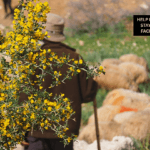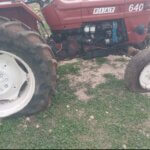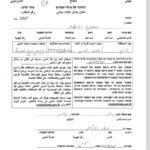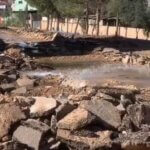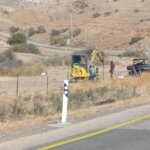Repression of Jordan Valley Palestinians escalated after November 2022 Israeli election
Just one month after the Israeli elections of 1st November 2022, the situation for Palestinians in the Jordan Valley has deteriorated significantly. Controls at checkpoints, confiscation of property and the issuing of demolition orders have escalated as the Israeli Occupation Forces launch a frenzied campaign targeting citizens, farmers and their properties in the northern Jordan Valley.
In just one day, on 10th December, they started action to destroy the lives of families in Atoof, Kirbet Ras al Ahmar and Al Hadidiya.
Yassin Rashaida, a farmer from the village Atouf, was issued with an Order to stop working on the construction of his house. It states that if the IOF observes him working, they will destroy the building and confiscate the materials.
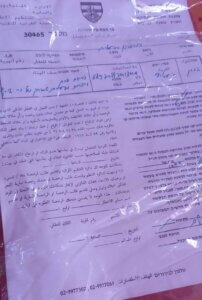
The occupation forces issued a demolition order for an agricultural water pipeline in the village Khirbet Al-Ras Al-Ahmar. It is owned by the farmer Muwafaq Fakhri Daraghmeh and his partners. The 150mm pipe, covering an area of 1.5km, feeds more than 1,300 dunums of agricultural land. The Order threatens that if Muwafaq does not remove his pipeline within 96 hours of the demolition order being served, the military will destroy it. Additionally, the IOF issued the same order for an agricultural road which leads to farm land located 2 kilometers outside of Al-Ras Al-Ahmar. Furthermore, Muwafaq Fakhri Daraghmeh and his partners received a demolition order for their greenhouses built on an area of 60 dunums which are used to cultivate with banana plants.
Ahmed Diab Ahmed Khaizran, another farmer from Al-Ras Al-Ahmar, was instructed to demolish his agricultural buildings. He and his partners also received a demolition order for their banana greenhouses which are constructed on 30 dunums of land, and for a 1.5 kilometers long water pipeline feeding more than 200 dunums of agricultural land. Near Al Hadidiya community, Israeli settlers started to build a new illegal outpost under the protection of the military forces. They began to construct buildings and to prepare agricultural land for cultivation. A shelter to keep animals and a house for the settlers to live in have already been built. Moreover, the settlers confiscated a part of the farm land of Al Hadidiya to grow wheat.
On 12th December, the IOF confiscated three tractors belonging to a farmer from Bardala village, two of them around midday and one in the late afternoon. The two farmers driving the tractors which were confiscated at noon gave a detailed account of the course of events. As they were on their way to work in a field in an area near Bardala, they came across several military trucks on the road. The soldiers stopped them and asked them to hand over their IDs and their phones. During this process, a drone was flying low over their heads. Then, the soldiers ordered the two farmers to follow them.
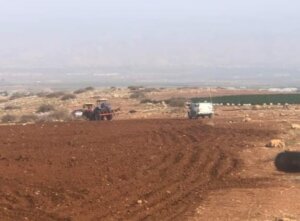
The military lead them in their tractors to the Mehola colony. There, the farmers were brought before the settlement council. A council executive told them that the land they drove on when the military stopped them was an illegal area and that they were prohibited to work there. Both answered that they did not know that this area was illegal and that they even have permission – according to an Israeli court decision – to work on a piece of land located behind the wall and the border. The road they drove on leads to this land. The council instructed the farmers to sign a document stating that they worked on the land of an illegal area, but both refused. They were given back their phones and IDs before they were released, but the IOF kept the two tractors in Mehola colony. The military went back to the area, and later confiscated the third tractor. In the evening, two of the tractors were transported out of Mehola colony, presumably to an army base further south in the valley.

